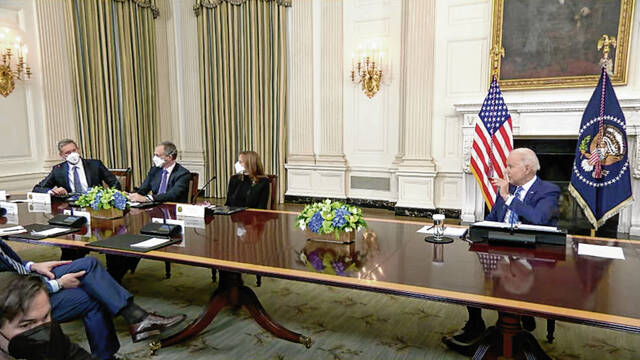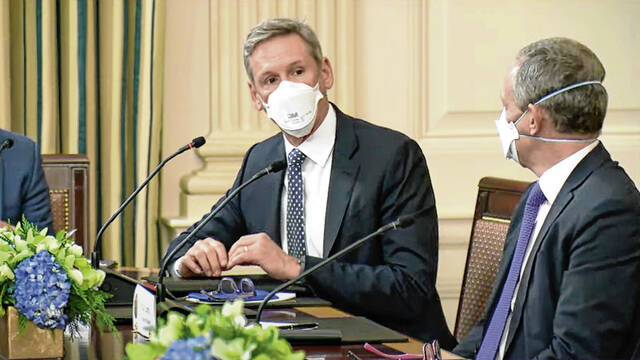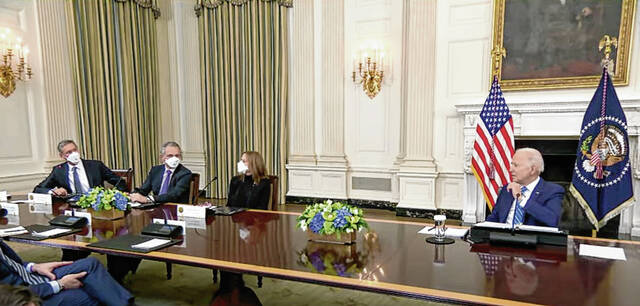
Cummins Chairman and CEO Tom Linebarger, left, talks during a panel discussion on infrastructure and climate change legislation at the White House on Wednesday.
Submitted photo

Cummins Chairman and CEO Tom Linebarger, left, talks during a panel discussion on infrastructure and climate change legislation Wednesday at the White House in Washington.
Submitted photo

Cummins Chairman and CEO Tom Linebarger, far left, meets with President Joe Biden at the White House on Wednesday.
Submitted photo
WASHINGTON — Cummins Chairman and Chief Executive Officer Tom Linebarger was at the White House on Wednesday to speak at an event focused on the potential benefits to businesses of a package of social and environmental initiatives that cleared the House last year but has since stalled in the Senate.
The nearly $2 trillion bill, called the Build Back Better Act, includes, among other things, $550 billion in spending and tax credits aimed at promoting clean energy as well as other provisions that would bolster family services, health care and other programs.
Linebarger joined President Joe Biden and top executives of nine other major corporations, including General Motors, Ford, Microsoft and HP, at the event.
The event started shortly after 1 p.m. with the president making some opening remarks about the bill, at one point saying “the industrial Midwest, believe it or not, is coming back. …It’s coming back and doing some of the most sophisticated manufacturing in the world.”
After Biden’s opening remarks, reporters started shouting questions at the president about his plans to fill a vacancy on the Supreme Court after Justice Stephen Breyer announced Wednesday that he would retire.
“I’ll be happy to talk about this later,” Biden told the reporters.
The president then turned his attention to Linebarger, who was sitting at the end of the table, and jokingly asked, “Do you want to go to the Supreme Court, Tom?”
Linebarger, who was wearing a mask, laughed and said, “I’m just going to demur on that one.”
‘A crisis’
During the meeting, Linebarger spoke for about 2 minutes, calling climate change “the existential crisis of our time” and expressing optimism that Cummins can make “a big investment and a big effort” to address climate change.
“But we can’t do it alone,” Linebarger told the president. “The truth is we need investments. (The) tax credits in the Build Back Better Act for hydrogen and clean trucks will play a big role in getting all of us to invest in infrastructure and other things that we need to get this going.”
“I think we’re out of time,” Linebarger said as he talked with Biden. “My view is that we’re out of time to protect our climate, and we’re out of time to make sure that American companies are the ones that lead the world in these technologies. When we invest, we can win, and we can create jobs for our workers here in the United States. That’s what we intend to do at Cummins.”
Then Biden started asking about social spending provisions in the bill, including child care.
“You’re one of the world’s largest engine manufacturers, and they tell me you have nearly … 60,000 employees now? And you’ve talked about being raised … by a single mom who worked through school caring for you and your brother. And for your employees and for your mom at home, what is the benefit of the Build Back Better provisions relating to child care from a business standpoint?” Biden asked.
“Mr. President, I would just say that my mom would be incredibly honored to even be in the conversation at this table,” Linebarger replied.
“…I would just say that we’re going to make whatever investments we need to do our part, and I really appreciate the efforts of this administration to put the climate first in this bill … and I hope that our leaders can see the future and the investments that need to be made to make sure climate change is addressed.”
Biden then asked Linebarger another question relating to, from a business standpoint, the child care tax credit.
“At Cummins, we’ve always been thoughtful about not only how our business does but how our communities do,” Linebarger replied. “And we think that our company can never be stronger than the communities in which we live and work. And there’s no question that the families that work for our company, child care is a significant burden to them, so it’s clearly an issue that needs to be addressed. And there’s no question that we hear about it a lot. We offered new benefits in our company of for both child care and for family leave, and I get more notes about that than pretty much anything else I do.”
“I bet you do,” Biden said before turning his attention to the president and vice chairman of Microsoft.
Gridlock
Wednesday’s event came as Biden faces a steep path to achieve his ambitious goal of slashing planet-warming greenhouse gas emissions in half by 2030, amid legislative gridlock that has stalled a $2 trillion package of social and environmental initiatives, The Associated Press reported.
The bill cleared the House on Nov. 19 in a party-line 220-213 vote, sending it to the Senate. Rep. Greg Pence, R-Indiana, voted against the measure.
But the bill was sidetracked in the Senate by Sen. Joe Manchin, D-West Virginia, who said just before Christmas that he could not support the legislation as written.
Democrats insist they are moving forward on the sweeping package, which also would bolster family services, health care and other programs. Manchin has signaled that climate-related provisions were unlikely to be a deal-breaker, but the bill has taken a back seat to voting rights legislation and other Democratic priorities.
Even without the legislation, Biden can pursue his climate agenda through rules and regulations. But those can be undone by subsequent presidents, as demonstrated by Biden reversing Trump administration rules that rolled back protections put into place under President Barack Obama.
A little behind
In a phone interview from Washington after the meeting with Biden, Linebarger said he supports the Build Back Better Act because it contains what he characterized as “critical provisions on clean trucks and hydrogen.”
However, Linebarger said his efforts extend beyond the bill and that, more than anything, he is pushing for the United States to take action right now to curb greenhouse gas emissions and avert the threat of catastrophic climate change.
Linebarger, who said the president was in a “congenial mood” on Wednesday, said, “I don’t know how we can look at our kids and grandkids and say, ‘We stood by when we knew we had to change this.’”
“Cummins has really put the weight of our investments, our people, our talent, our future really betting on the fact that we’re going to have to come up with solutions to climate change,” Linebarger said. “…For us to build electric vehicles or electric truck power trains, we need to make sure that there’s charging for that. There has to be infrastructure for charging trucks, and you have to be able to build batteries in the U.S., not import everything.”
The same would be true with fuel cells, he said.
“To build fuel cell trucks, we’re going to need clean hydrogen. We’re going to need to be able to build the materials here. And that’s going to take a lot of investment by a lot of people, and it’s going to require infrastructure investment and regulatory structures that the government’s going to have to play a role in,” he said.
Cummins has unveiled plans over the past couple of years for how it intends to ramp up its fuel cell and hydrogen production business, which company officials have said in previous interviews they expect will play an important role in cutting emissions in some of the industries that are most dependent on fossil fuels and now face strict climate targets in many countries.
In July, Cummins announced it was testing a hydrogen-fueled internal combustion engine in what was the Columbus-based company’s latest effort to “meet the energy and environmental needs of the future” in a world that experts say appears poised to shift away from fossil fuels.
Linebarger said Wednesday that “we have to make investments in technologies that will reduce carbon or our planet will suffer, and frankly, our companies will suffer because other countries will be first.”
“Frankly, we’ve already lost the first two innings in this game,” Linebarger said. “We’re behind a little bit on climate change technologies in the U.S., so we’re out of time.”
